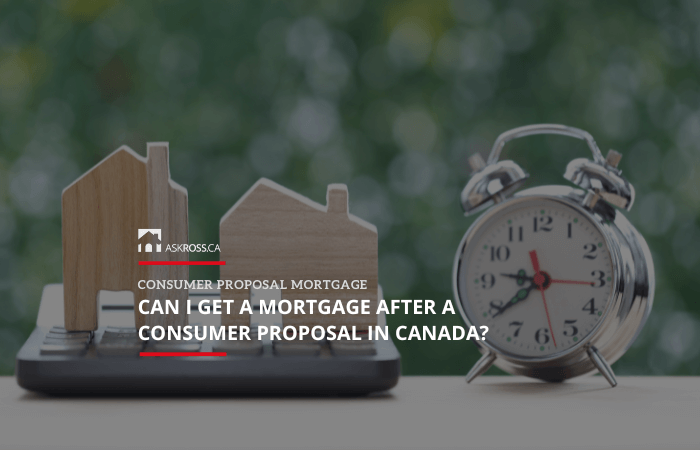
Published: April 17th, 2025 • Last Updated: June 9th, 2025
Author: Ross Taylor on AskRoss.ca
How to Get a Mortgage After a Consumer Proposal in Canada: Steps & Strategies
If you’ve recently completed a consumer proposal — or you’re still in one — and you’re wondering whether you can get a mortgage in Canada, you’re not alone.
I hear this question all the time, and the answer is yes, you absolutely can. But (and there’s always a but), it’s not quite as simple as walking into your local bank and getting pre-approved on the spot.
Consumer proposals are a powerful debt relief tool, but they do leave a footprint on your credit report. That doesn’t mean your dreams of homeownership are off the table; it just means you’ll need a clear strategy, a little patience, and the right people in your corner.
In this guide, I’ll break down what you really need to know to confidently apply for a mortgage after a consumer proposal.
Jump to a specific section in this article ↓↓
- How long should you wait after a consumer proposal before applying for a mortgage?
- Are alternative lenders a realistic option after a consumer proposal?
- What steps can I take to improve my chances of mortgage approval?
- How much down payment do you need for a mortgage after a consumer proposal?
- Can you renew or refinance your current mortgage during or after a consumer proposal?
- Should I use a mortgage broker after a consumer proposal?
- Your mortgage journey after the consumer proposal is achievable with smart planning.
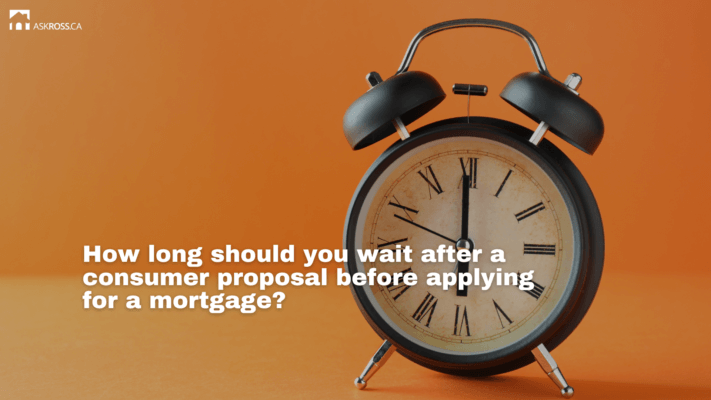
How long should you wait after a consumer proposal before applying for a mortgage?
Once you’ve completed your consumer proposal, timing becomes your friend…or foe. While you’re no longer burdened by debt, traditional lenders (think banks and prime lending institutions) generally want to see some solid credit history established after your proposal is finished.
Typically, you’re looking at a minimum of two years before a bank mortgage becomes a realistic possibility.
On the other hand, alternative lenders may be ready and willing as soon as you complete your proposal. It all depends on the details (and the size of your down payment)
The good news? During these pivotal couple of years, you can and should be rebuilding your credit proactively.
↑↑ Back to the list at the top ↑↑

Big Banks (A-lenders)
Most will want to see at least two years of re-established credit after your consumer proposal is fully paid off and officially completed. On top of that, they’ll be looking for a good credit score.
Key things to know about A-lenders:
- Require a minimum credit score of 650 (the higher, the better).
- Expect two active trade lines (like credit cards or loans), each with at least $2,000 limits, and reporting for at least two years.
- Prefer applicants with steady employment and a consistent income history.
- A-lenders tend to be cautious, so they want to see a solid, well-documented financial recovery.
- CMHC (and other mortgage insurers) will require a minimum two-year waiting period post-proposal, along with a strong income and credit profile.
↑↑ Back to the list at the top ↑↑

Alternative lenders (B-lenders)
If two years feel like a lifetime, there are faster mortgage opportunities available. Alternative or “B” lenders offer pathways to homeownership much sooner than traditional lenders.
These lenders are more flexible. Some are willing to consider a mortgage even just one day after the proposal is completed, sometimes even while you’re still in it, depending on your income and equity position. However, speed and flexibility usually come at a higher interest cost.
Key things to know about alternative lenders:
- May approve a mortgage immediately after your consumer proposal is discharged — sometimes even sooner.
- Charge higher interest rates to offset the added risk.
- Typically, they require a larger down payment, often between 20% and 25%.
- Focus more on your equity position and overall financial situation rather than strict credit scores.
- A great option if you’re in transition and rebuilding your financial track record.
- These mortgages are not insured, so lenders expect you to have more skin in the game.
↑↑ Back to the list at the top ↑↑

Private lenders (Short-term solution)
When the banks and alternative lenders aren’t a fit, whether your credit is still recovering or your income doesn’t fit the usual mould, a private lender can be a practical fallback.
They don’t focus so much on credit scores or standard income documents. What matters most to them is how much equity you have in the property.
These mortgages are usually short-term and interest-only, meant to buy you time while you work toward qualifying with a more traditional lender. It’s not a long-term fix, but in the right situation, it can keep your plans on track.
Key things to know about private lenders:
- Focus almost entirely on the value of the property and the amount of equity you have — your credit history plays a much smaller role.
- Offer short-term mortgage solutions, typically meant as a bridge until you can qualify with a B or A lender.
- Often, loans are structured withinterest-only payments to help with cash flow, but this isn’t a long-term fix.
- Private lenders are best suited for unique or time-sensitive situations where traditional lenders won’t step in.
↑↑ Back to the list at the top ↑↑
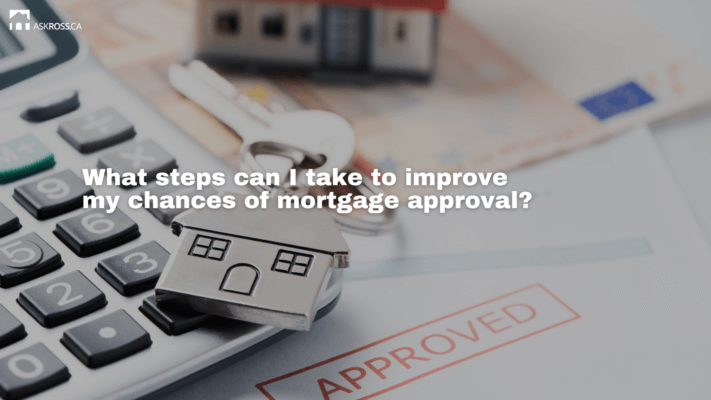
What steps can I take to improve my chances of mortgage approval?
Rebuilding your credit isn’t glamorous, but it’s necessary. If you’re serious about homeownership after a consumer proposal, your best bet is to show lenders that you’re responsible, consistent, and in control of your finances now.
How to rebuild credit after a consumer proposal
Get two new credit products
- Secured credit cards or a small car loan can do the trick. Use them responsibly and keep your balances low.
Make every payment on time
- For your new credit products, be sure to either set up automatic payments or make two or more payments each month so you never have a late or missed payment on your report.
This latter method is also your best chance of your credit card issuers sending low credit card balance information to the credit bureaus. This reflects on your credit utilization ratios, and the lower the better.
Check your credit report
- Make sure your consumer proposal is properly reported as completed. Mistakes on your credit report can happen after a consumer proposal and will need to be fixed to improve your chances of approval. Our credit repair service helps with exactly this.
Keep your credit utilization low
- Don’t max out your cards — lenders want to see that you can manage credit, not that you’re constantly relying on it. You should be paying your balances in full each month.
↑↑ Back to the list at the top ↑↑
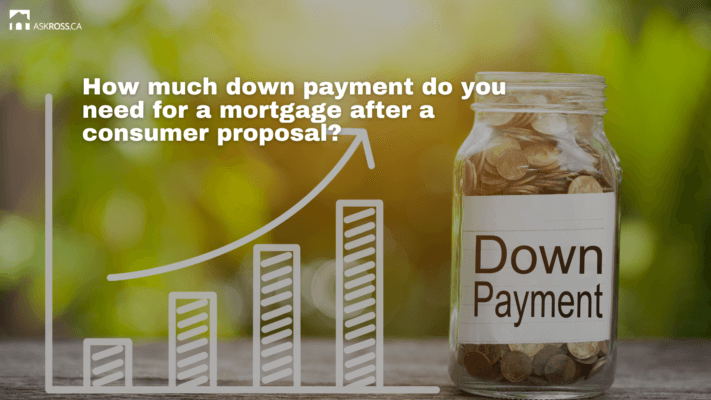
How much down payment do you need for a mortgage after a consumer proposal?
All lenders look for reassurance in mortgage applications. Post-consumer proposal, that reassurance often comes in the form of cold, hard cash—aka your down payment.
A-lenders (banks and major institutions)
- If it’s been two years since your proposal was completed and your credit has been rebuilt exceptionally well, you might qualify for a 5% to 10% down payment under CMHC-insured guidelines.
- That said, this scenario is pretty rare — it really depends on having a near-pristine financial recovery and ticking all the right boxes.
Alternative & private lenders
- If you’ve recently completed a consumer proposal, you’ll typically need at least 20% to 25% for your down payment.
↑↑ Back to the list at the top ↑↑

How to prepare your down payment post-consumer proposal
Lenders see larger down payments as a sign of financial responsibility, especially for borrowers with a history of insolvency. The more you can put down, the less risk they take on, and that can lead to better terms and rates.
Here’s how you can prepare:
- Start saving rigorously—aim for at least 20% to improve your eligibility with most lenders.
- Leverage RRSPs, gifts from family members, or other strategies to boost your down payment.
- Demonstrating substantial savings capacity signals financial responsibility and determination to lenders.
A larger down payment increases your credibility as a borrower. You’ll have more flexibility and a better chance of landing a mortgage that sets you up for long-term success.
↑↑ Back to the list at the top ↑↑
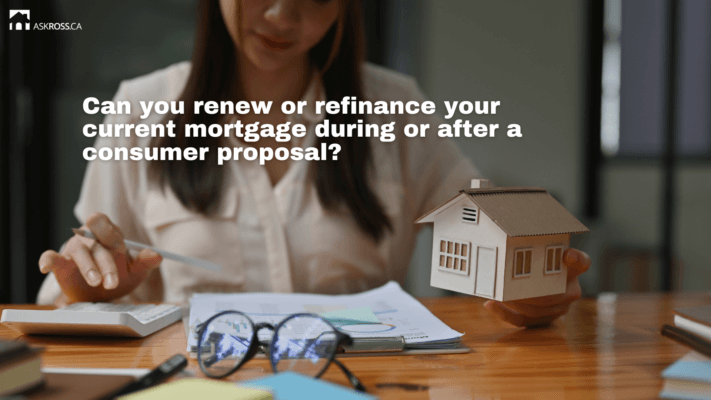
Can you renew or refinance your current mortgage during or after a consumer proposal?
If you already own a home and are in the middle of a consumer proposal, you might be wondering if you can still renew your mortgage or, better yet, refinance to pay off the proposal itself.
What to remember when renewing during a consumer proposal
If you’re simply renewing your mortgage with your current lender, chances are they’ll let you do so with little hassle, as long as your payments have remained on track. Most lenders don’t do a full re-qualification at renewal, especially if you’re not asking for more money or changing the term significantly.
- Prioritize making timely payments during your proposal to strengthen your renewal position.
- Expect fewer complications when renewing with your existing lender versus when shopping for a new one.
Refinancing during a consumer proposal
Refinancing is a bit trickier. Many traditional lenders won’t touch a refinance request if you’re still in a proposal.
That’s where private or B lenders can come in. In some cases, refinancing your home could be a smart way to pay off your consumer proposal early, freeing you up to rebuild your credit and move toward a conventional mortgage sooner.
- Be cautious with refinancing during or shortly after a proposal; your rate and opportunities could be limited or more expensive.
- Engage professional guidance if considering refinancing or switching lenders post-consumer proposal.
↑↑ Back to the list at the top ↑↑

Should I use a mortgage broker after a consumer proposal?
Absolutely. And not just any broker — you want someone who understands how to work with people who’ve gone through credit events like a consumer proposal. It’s a specialized area, and not every broker (or bank, for that matter) knows how to handle it properly.
Why the right broker makes a difference
Access to B lenders and private lenders
- These lenders often don’t deal directly with the public, so you need a broker to connect the dots.
Tailored advice
- A good broker will take the time to understand your unique situation and guide you on the right timing, the right lender, and how to get the best possible terms.
Credit repair strategy
- It’s not just about getting you into a mortgage today — it’s about rebuilding your credit so you’re in a stronger position to qualify for better rates and terms in the future.
The right person in your corner
- Negotiating terms and rates on your behalf, securing you a better mortgage solution than you’d find solo.
- At Ross Taylor Mortgages, we are one of the very teams across all of Canada who are licensed mortgage agents AND who have a registered credit counsellor on board.
↑↑ Back to the list at the top ↑↑

With smart planning, your mortgage after a consumer proposal is completely achievable
A consumer proposal doesn’t mean the end of your dream of homeownership — not by a long shot. But it does mean you need to be a little more strategic, patient, and proactive in how you approach getting a mortgage.
You’ll need time to rebuild your credit, possibly work with alternative lenders, and likely come up with a bigger down payment. But with the right guidance, a realistic plan, and a bit of grit, it’s entirely doable.
If you’ve completed a consumer proposal (or are still in one) and want to talk through your mortgage options, reach out. I’m always happy to help you figure out what’s possible for you and your situation—let’s get you home!
↑↑ Back to the list at the top ↑↑

Ross Taylor Mortgages
If you want great service from someone you can trust – reach out to us today.
Get quick answers to your questions, no matter how difficult – 7 days a week.

 Apply For a Mortgage
Apply For a Mortgage